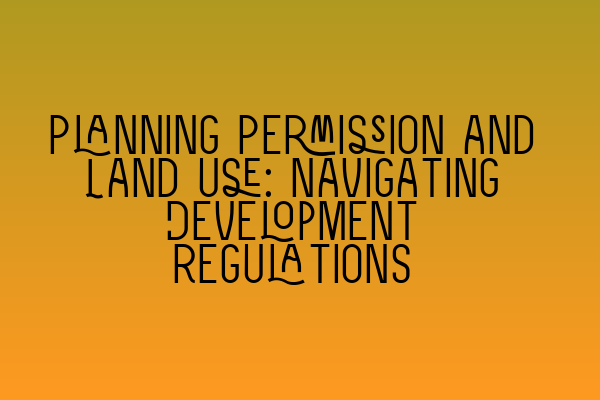Planning Permission and Land Use: Navigating Development Regulations
Welcome to SQE Property Law & Land Law Blog. In today’s post, we’ll be diving into the intricate world of planning permission and land use. As a property owner or developer, understanding the regulations and requirements surrounding development is crucial to ensure a smooth and successful project. So let’s get started!
Planning permission is the first hurdle in any development project. It is a legal requirement that grants permission for specific land use or changes to existing properties. Obtaining planning permission is essential to ensure that your development is lawful and in compliance with local, regional, and national planning policies.
Before beginning any development project, it’s important to thoroughly research and understand the planning regulations in your area. This includes familiarizing yourself with any local development plans, zoning regulations, and environmental policies that may impact your proposed project.
Key Factors to Consider:
1. Development Impact: One of the main considerations in the planning process is the impact your development may have on the surrounding area. This includes factors such as traffic, noise, environmental impact, and visual aesthetics. Understanding and addressing these concerns in your planning application will increase your chances of getting permission.
2. Land Use Designations: Every plot of land has a designated use, such as residential, commercial, agricultural, or industrial. It’s crucial to ensure that your proposed development aligns with the land use designation of the site. Sometimes, planning authorities may grant exceptions or variances, but it’s important to consult with legal professionals to understand the process.
3. Conservation Areas and Listed Buildings: If your development site is located within a conservation area or involves a listed building, additional regulations and restrictions may apply. Preservation of historical and cultural assets is given high priority, so it’s essential to work with experts to navigate these specific regulations.
4. Consultation and Community Engagement: Consulting with local residents and stakeholders is an important step in the planning process. Engaging with the community and addressing their concerns can help build support for your project. By showing that you have taken into account the views and opinions of the local community, you’ll enhance your chances of obtaining planning approval.
5. Planning Permission Applications: Once you have thoroughly considered all the factors above, it’s time to submit a planning permission application. This application should include detailed plans, drawings, and supporting documents to demonstrate that your proposal complies with all relevant regulations. Engaging professional solicitors with expertise in planning law can greatly assist in the preparation and submission of your application.
It’s crucial to note that failure to obtain planning permission before commencing development can result in severe consequences, including fines, stop notices, or even demolition orders. Therefore, it’s always better to comply with the required regulations and seek professional advice to ensure a successful project.
At SQE Property Law & Land Law, we specialize in navigating the complexities of planning permission and land use regulations. Our team of experienced solicitors can guide you through the entire process, from initial research and application preparation to navigating any legal challenges that may arise.
To deepen your understanding of UK property laws, be sure to check out our related articles:
– Updates in UK Property Laws: Key Changes and Implications
– Legal challenges in property transactions: A comprehensive guide
– Navigating Lease Laws in the UK: Essential Guidelines for Tenants and Landlords
– Dominate Property Law Questions: Avoiding Common Pitfalls
– Land Law Revision Tips: Ace Your Exam Preparation
In conclusion, obtaining planning permission and navigating land use regulations can be a complex and challenging process. It requires a thorough understanding of local planning policies, compliance with environmental regulations, and effective community engagement. By partnering with skilled solicitors like SQE Property Law & Land Law, you can ensure that your development adheres to all necessary regulations, increasing the likelihood of a successful outcome. Contact us today to discuss your project and let us guide you through the intricacies of planning permission and land use.
